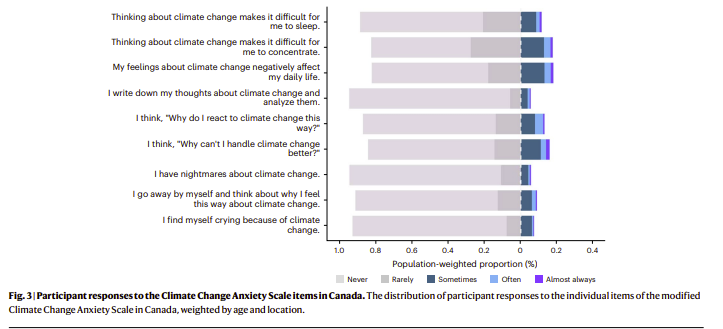Canada ranks 3rd in antidepressant use, driven by “climate anxiety”: study
A major international study led by Canadian researchers warns that climate anxiety is becoming an urgent but under-recognized mental health issue, particularly among youth.
A major international study led by Canadian researchers warns that climate anxiety—a growing sense of fear and hopelessness over environmental collapse—is becoming an urgent but under-recognized mental health issue, particularly among youth.
The report, published in Nature Mental Health on Tuesday found that antidepressant use rose by 63 per cent across 20 countries between 2008 and 2019. While the surge is often attributed to growing awareness and treatment of mood disorders, the authors say it also masks emerging stressors like climate-driven psychological distress.
“Climate anxiety is real and increasingly affecting mental health, especially among young people who are deeply worried about the future of the planet,” said Dr. Paul Kurdyak, senior author and lead CAMH scientist.
The study references a growing volume of international literature linking eco-anxiety—particularly fear over wildfires, rising temperatures, and biodiversity loss—to increases in anxiety, depression, and trauma symptoms.
Among the countries analyzed, Canada ranked third highest in antidepressant consumption per capita by 2019, behind Iceland and Australia.
At the same time, surveys cited in the report show that more than half of young people in Canada and globally say climate change makes them feel sad, anxious, angry, powerless or guilty.
The authors note that while some climate-related anxiety may be adaptive—encouraging civic engagement or sustainable behaviour—it can also lead to psychological impairment, especially when people feel helpless or distrustful of governments.
“Not all climate distress needs a prescription,” the authors wrote, “but it does need to be acknowledged by clinicians and supported through evidence-based care.”
The study calls for mental health systems to integrate climate-related distress into diagnostic assessments, training, and treatment planning. It also warns that many lower- and middle-income countries lack the surveillance tools needed to capture the scale of eco-anxiety — even though they are often the most exposed to environmental disasters.
The report was funded by the Canadian Institutes of Health Research and conducted with international collaborators from Sweden, the U.K., and Switzerland.





No wonder they are anxious. From the time they enter Day 1 of Pre-K in the Public system until they move the tassel over on their mortarboard they are inundated with lies, insinuations and half truths on the subject of anthropogenically caused climate change. They must be terrified! Just one more reason for honest and legitimate funding of education by government and true school choice.
CO2 follows a warming planet as we exit that last mini ice age. In other words, a warming planet is not manmade and is part of the natural biorhythms of the earth. Man is not warming the planet. It's not anthropogenic. The fear mongering about climate is a trillion dollar industry making politicians, scientist, NGOs and corporations wealthy. The financial investment in the climate change narrative is too great to abandon for those who are invested in it. That's the problem.